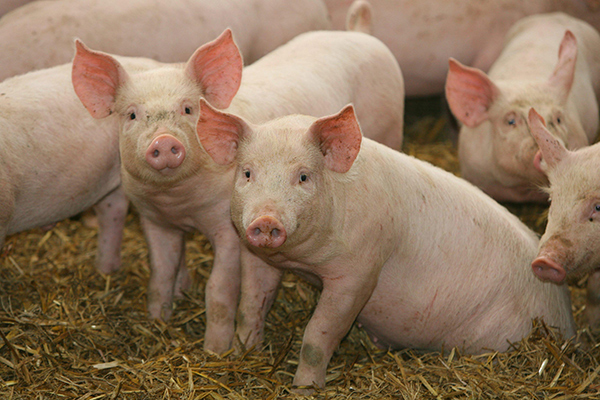A cull of healthy pigs has begun on farms as a drastic shortage of skilled butchery workers has led to a backlog in abattoirs and an unprecedented situation in the meat supply chain.
Animal welfare, the viability of farm businesses and the supply of British pork are all threatened as a mass cull is looking increasingly likely, according to pig farmers, who have laid the blame squarely at the government’s door.
Pig farmers have been warning of the building crisis for several months, with protestors outside the Conservative party conference this weekend highlighting the issue.
Farmers reacted with anger when Prime Minister Boris Johnson appeared to dismiss concerns, stating that “our food processing industry does involve killing a lot of animals”, while environment minister George Eustice pointed the finger at processors who he said are prioritising EU meat.
The chief executive of the National Pig Association, Zoe Davies, said: “We know of a handful of farmers who have had to cull some pigs – around 600 we are aware of in total. There has been no mass culling yet – although I do believe this is the next stage in the process.”
A statement from campaign group Save British Bacon said: “Pig farmers are in a dire situation. They are being forced to kill healthy pigs because there is not enough room on pig farms.
“A combination of Covid and Brexit has led to a shortage of skilled labour in the processing. Since January as a result of Brexit, export checks from the UK have been very strict. Three are still no import checks and the start of this is unknown. This means importing is easy and exporting less so.”
It comes amid a growing shortage of workers across multiple sectors, exacerbated by Covid, and leading to a vacuum in vital jobs across the food supply chain, including butchers, drivers, packhouse workers, fruit and veg pickers and hospitality workers, leading to questions around the wages, working conditions and the value placed on these jobs in society post-Brexit.

Pigs are bred on a weekly cycle meaning the supply of live animals ready for slaughter builds up quickly and leading to the current situation. Intensive farming systems, where pigs are kept indoors and fed, have little excess space. While organic pig farmers are not currently facing the same issues, as the amount of organic pork produced in the UK is fractional, and with outdoor farming there is more room to hold pigs on farms, organic farmers are also warning of the same pressures in abattoirs.
Managing director of organic pork supplier Helen Browning’s Organic, Vicky McNicholas, said the shortages have definitely been worse since Brexit, but “Covid has been the real catalyst”.
“Many people who were planning to stay after Brexit decided to leave to be with their families during Covid,” she said. “So an already tight labour market became tighter. Add to that Covid illness and self isolating, and also these staff have worked all the way through Covid with very little furlough as demand for meat increased and they are tired. A perfect storm all round,” said McNicholas.
“[This is] a sector of workers who are, in my opinion, unsung heroes doing a skilled job for relatively low wages and under appreciated by society who have got used to cheap food and therefore underrate the value of food.”
While Brexit has accentuated the labour shortages particularly in fruit and veg picking, which relies on largely seasonal labour from eastern Europe, in butchery there has also been a longer-term decline in people entering the trade, as well as an ageing workforce.
Manager of organic veg box company Riverford’s butchery, Matt Flynn, said: “In 2019, the nationwide average of EU workers in meat processing companies was around 70 per cent, of which, roughly 40 per cent were skilled butchers and slaughter line workers. With many EU workers returning home after Brexit, this has left a hole in the industry that is very hard to fill.
“Wages for butchers have risen due to demand and the lack of skill set, but before now the average butcher pay was around £10/ hour, which is lower than an Amazon warehouse worker in some cases. This, along with the heavy work and demands of the role have made it very hard to recruit new people into the industry.”
For McNicholas, it’s about more than just higher wages. “It’s far more about the fact we haven’t valued our food correctly. We spend more on premium crisps than we do on 200g of meat – that’s the real difference.”
And while the cost of food doesn’t reflect the cost of producing it, there’s also the question of making jobs more appealing, she said.
“For an awful lot of people, it’s not about the money they earn, it’s about the conditions and the values of the company they work in,” she added.













I think I was 15 when a group of us from grammar school started working in the town’s abattoir (always referred to as the bacon factory) in the holidays and Saturday mornings. It was hard work but satisfying, and we had plenty of laughs. That was in 1965. Several workers were from Jamaica – I assumed quite recent immigrants.
Most of us did whatever needed doing. In the morning, when we were killing, I sometimes worked in the stunning pen and sometimes on the scalding tank where, with another lad opposite, we pushed the now dead pigs through with long wooden poles, then operated the machine that tumbled them around to scrape off most of the bristles. Pigs destined for bacon then went, one at a time, into the singer (a quick burst of gas flames) which removed remaining bristles and gave the pinky white skin a ‘tan’ that we see on bacon. I tried my hand at gutting but it takes more skill and experience than I had to do that job well and fast. If you accidentally cut the gut or stomach the smell was ‘powerful’!
One job I was trained to do was, using an optical probe, measuring the thickness of fat at various points on the carcase and recording the numbers on paper. I can’t remember the reason for this. Perhaps it affected what farmers were paid.
Pork pigs were shaved with large, wide-bladed knives. They had to be kept sharp. We became skilled with the oil stone, and we each had a steel hanging from our waist. Pork pigs remained whole and, I think, were delivered to butchers’ shops like that. Bacon pigs were sawn into two halves and prepared for the brine tanks. Each ‘side’ of pig was pushed along parallel roller tables with people on either side doing various jobs. One I recall doing was pulling out shoulder blades, using a fixed gadget, after the man next to me had loosened it, and then stuffing salt into the hole.
The worst job in the bacon factory was unloading the brine tank and loading up the smoke room. The sides had to be carried over one shoulder and loaded on to a pallet. They were saturated with brine, cold, heavy and slippery. Getting cold, salty water down your neck was not the most pleasant experience I could think of, and if you had a cut you soon found out where it was. A pallet load was taken, via a lift, up to the smoke room, where the sides had to be lifted up onto hooks.
The best job in the factory was unloading the smoke room. The sides were dry, and therefore lighter; they were warm, and smelled deliciously of smoky bacon, because that is what they were! We sometimes pulled bits off and ate them.
So, if you eat meat, if you’re fit and strong, if you’re unemployed, between courses or taking a gap year, consider doing your bit to help with the pig crisis by applying to work in an abattoir. I dare say working conditions have improved since the sixties.
No matter what sort of career one hopes to have, I think everyone should spend some time doing work that is essential to how society works. Yes, I have worked on farms, which was also hard work but satisfying and with plenty off laughs – and I wasn’t even being paid! That was in Norway and Iceland, through WWOOF and I was in my late fifties!
Your comment is very interesting. I dont eat meat but in the past we have killed pigs here on our Spanish farm. The man who came to do the deed was never rough or aggressive and always thanked the pig. I hated the actual moment as we had raised the pig from very young but I actually enjoyed the work once it was underway. In fact I enjoyed cleaning the intestines for chorizo and black pudding. It took at least 2 days to complete everything and our neighbours helped as they knew exactly what to do.
I quite agree with you when you say that everyone should have a go at this sort of job and the people who do it every day are real heroes. In fact nowadays even olive picking has become a mad and noisy rush and an extremely hard job, far from the days when men sang across the groves as they worked with long poles to bring the olives down. I’m not saying the old days were better but there are still some very hard hands on jobs that, even with machines, seem to get harder.
Anyway, I enjoyed reading your comment and the article was interesting if disheartening..
Our meat/animal industry is going through a hard time. We pay people low wages to carry out a job which many would not do and probably don’t know how hard it is on the poor victims. People killing animals all day. What does that do to those involved? How does it affect them mentally? Perhaps if more people worked in abattoirs we would have more vegans? The pigs, farmers are having to cull (kill) were all destined to be killed anyway. So does that mean the animals are merely an economic unit and that is the concern?